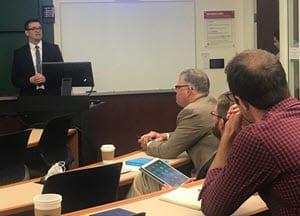ISO-NE speaks to veterans on regional fuel-security challenges; helping solve energy challenges can provide mission-driven service for vets
On September 27, Norm Sproehnle, ISO New England Manager of Outage Coordination and U.S. Navy veteran, discussed New England’s Fuel Security Challenge with approximately 25 people at the 2018 Veteran’s Energy Seminar, held at Boston University. According to their website, “the Veteran’s Energy Seminar is designed to inspire veterans to use their technical skills and knowledge to continue service to the country after they leave the military in a way that positively impacts our national security. The program is based on training by the U.S. Department of State which introduces Foreign Service Officers to the fundamentals of energy fuels, markets, and regional conflict.

Veterans comprise approximately 10% of all U.S. energy jobs and possess a rare set of highly technical skills that can be put to use towards achieving a secure energy future. While there are numerous programs available for workforce training and job placement in the energy industry, there are very few educational opportunities which align a veteran’s unique experience into mission-driven service for a stronger energy security future. The Veteran’s Energy Seminar fills this education gap to supplement the self-teaching that takes place after a service member leaves the military.”
Other speakers and topics at the 2018 Seminar included:
- Dr. Dorothy Robyn, Senior Fellow, Former Deputy Under Secretary of Defense for Installations & Environment, discussed the way the Department of Defense supports early-stage technology research. She also described her efforts at DOD providing oversight of energy use at U.S. military bases around the world, which involved an $850 billion portfolio that included 300,000 buildings and 28 million acres of land.
- Roger Sorkin, Executive Director and Producer, American Resilience Project, discussed and showed his short film, The Burden, which argues that fossil fuel dependence is the country’s greatest long-term national security threat, and why the military is leading the transition to clean energy
- Dr. Frank O’Sullivan, Director of Research, MIT Energy Initiative, discussed international trends in oil, gas, coal, nuclear, and renewable industries: impacts on energy dependence and international markets.
- Erik Limpaecher, Group Leader, MIT Lincoln Laboratory, discussed his research and development work on how better to prepare for natural disasters and catastrophes, highlighting work he and his team have done on water systems in post-Hurricane Maria Puerto Rico.
- Categories
- Recent Publications & Events
- Tags
- careers, energy adequacy



